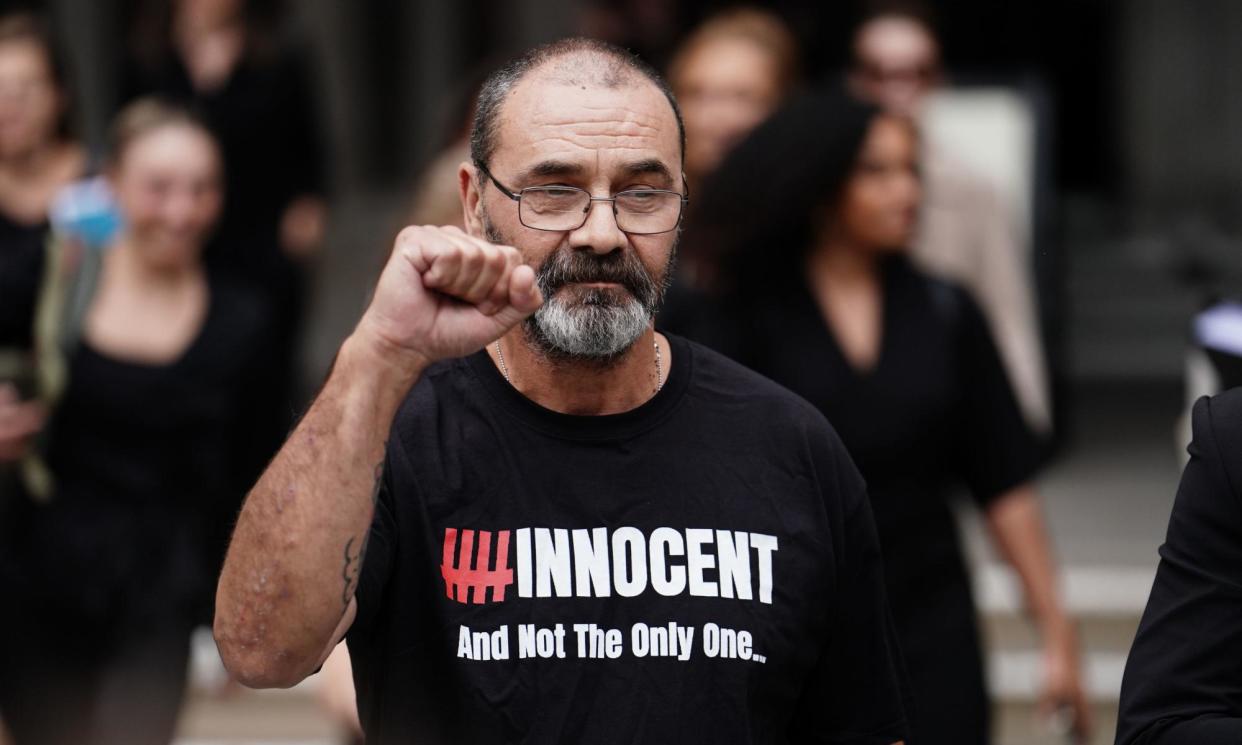Majority verdicts facilitated 56 miscarriages of justice in England and Wales, charity says

At least 56 miscarriages of justice have occurred in cases in England and Wales where the jury was split, according to a charity, which says jury unanimity should be reintroduced to safeguard against wrongful criminal convictions.
The research by Appeal, the miscarriage of justice charity, says majority verdicts “arguably dilute the principle of reasonable doubt” and have facilitated miscarriages in cases including those of Andrew Malkinson, who spent 17 years in prison for a rape he did not commit; Barry George, who was wrongly convicted over the death of Jill Dando; and Winston Trew, one of the Oval Four.
The true number of majority verdicts that have been overturned could be much higher but the data is not available – another issue the report says should be addressed.
Nisha Waller, a co-author of the report, said: “Had the jury unanimity requirement not been scrapped in 1967, Appeal client Andy Malkinson might have been spared more than 17 years of imprisonment. Two of Andy’s jurors were not convinced he was guilty, but their doubts were dismissed. The courts and the CCRC [Criminal Cases Review Commission] need to tally up how many overturned convictions and cases under their review involved jurors voting ‘not guilty’ so we can examine the impact on miscarriages of justice.”
Majority verdicts, which allow up to two jurors out of 12 to dissent, or one where there are 10 or 11 jurors, account for about 15% of crown court convictions each year, according to the report.
By contrast, in the US a landmark 2020 case, Ramos v Louisiana, outlawed majority verdicts for serious crimes. (At the time they were only allowed in Louisiana and Oregon.)
Waller and co-author Naima Sakande highlight research in the US by the Advocate, which found that 56% convictions in Louisiana whereby the defendant was later proven innocent were the result of a majority verdict.
The report, which will be officially launched on Wednesday, builds on a previous study by Appeal, which investigated the motivation for introducing majority verdicts in criminal trials in England and Wales and found that it was partly a desire to dilute the influence of minority ethnic people and members of the working class serving on juries.
The new report says people from such backgrounds “were seen as threats to safe judgment and considered deliberation” and that “a 700-year-old system of juror decision-making was cast aside, at least in some part based on racist and classist desires, and has remained unexamined since”.
The authors contrast the lack of rigorous jury research in the UK – due to restrictions under the Contempt of Court Act – compared with the US, where the literature “provides compelling evidence that race influences jury decision-making and trial outcomes, whether this be influenced by a defendant’s race, or the jury’s racial composition”.
They say the Contempt of Court Act, by criminalising discussion of what happened during deliberations, “is an enormous impediment to the study of the impacts of majority verdicts in real cases”.
The report highlights cases where jurors raised concerns about discrimination within the deliberations room and defendants subsequently appealed against their convictions but the protection of jury secrecy took “precedence over efforts to prevent racism or prejudice against defendants by the jury”.
Waller said: “Jurors are the only decision-makers in the criminal justice system not subject to research. Even when jurors have raised concerns about racism and prejudice in deliberations, the courts have refused to investigate this. Juries are a vital component of the criminal justice system. How they function can be improved – but not if they are exempt from scrutiny.
“The law should allow for academic research with real juries in real cases in a way that would both protect juror anonymity and allow for informed policymaking.”
Trew, one of several men who were “fitted up” by the racist police officer DS Derek Ridgewell said: “Two jurors in my case were not convinced of my guilt, but their doubts were dismissed. Had the majority verdict rule not been in place, I would not have been convicted for crimes I did not commit; nor would I have spent nearly 50 years, most of my adult life, trying to clear my name. Today the majority verdict rule is considered to be the harbinger of wrongful convictions and should be scrapped.”
A Ministry of Justice spokesperson said: “Jury trials have been shown to deliver fair and impartial results in successive academic studies. While jurors are directed that their verdict must be unanimous at the start of any case, independent judges may decide to accept a majority decision where this is in the interest of justice.”

 Yahoo News
Yahoo News 
